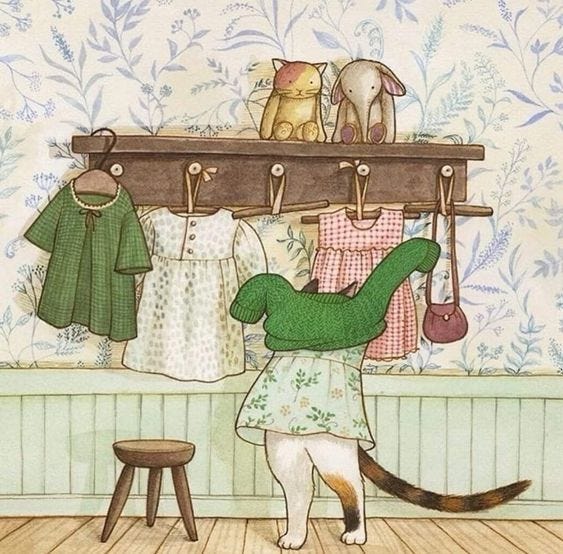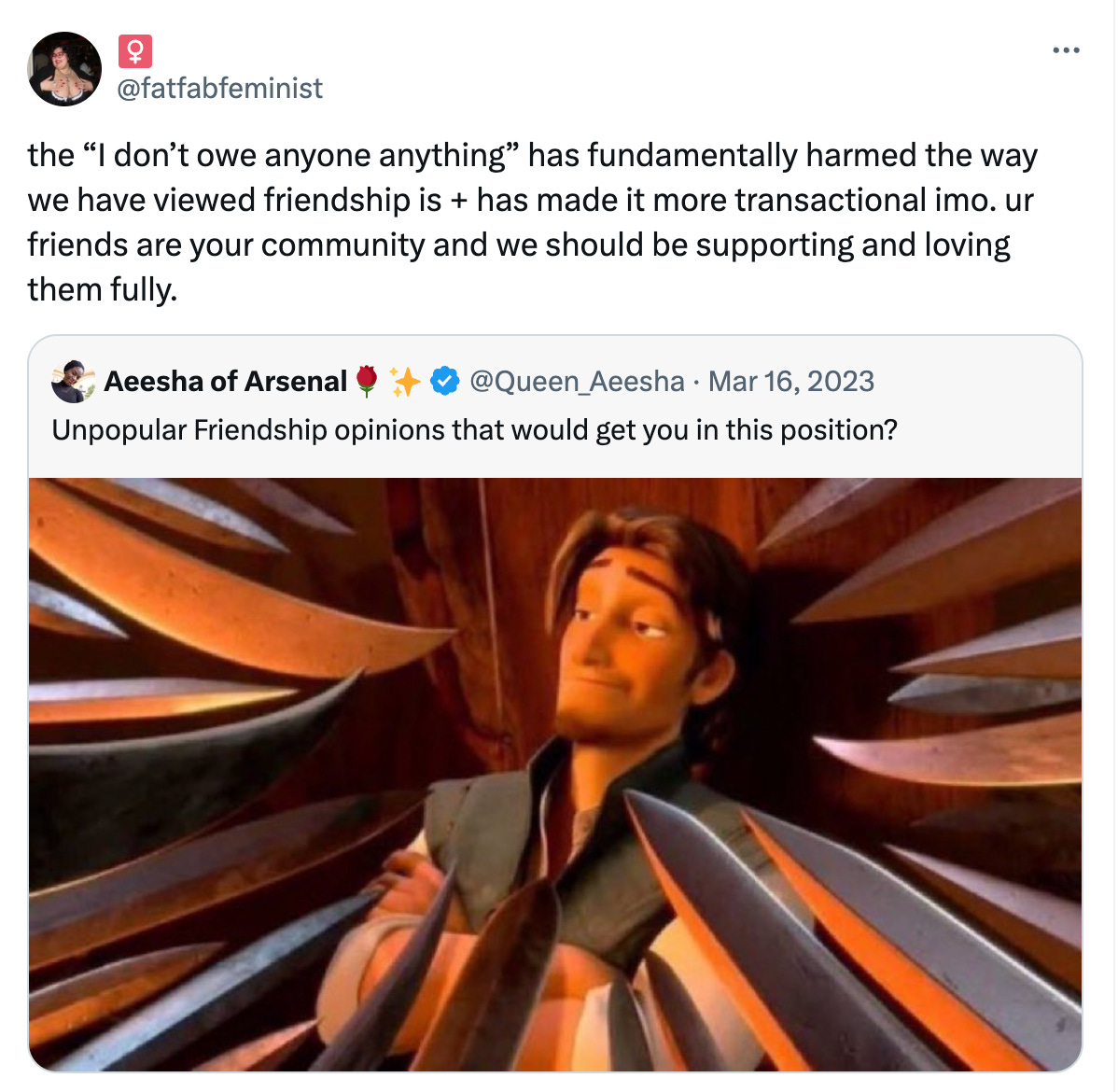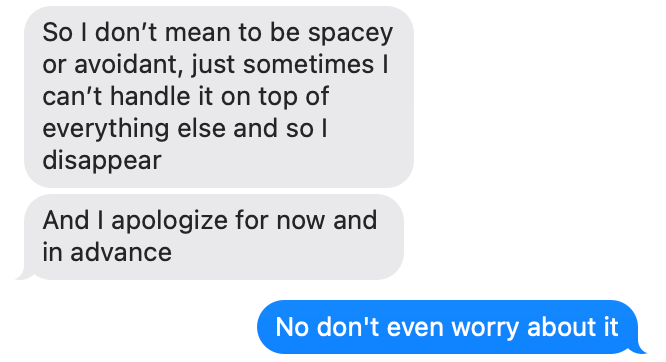we have forgotten how to be kind
postcard 19: on transactional friendships, therapy speak, and being a good person
And I love that about humanity, and in fact it's the very reason I root for us to survive—because we are so stupid about each other.
prelude
Anne always remembered the silvery, peaceful beauty and fragrant calm of that night. It was the last night before sorrow touched her life; and no life is ever quite the same again when once that cold, sanctifying touch has been laid upon it.
—Anne of Green Gables, L.M Montgomery
A few weeks ago, I came across a Tiktok of a woman explaining that she was ‘quiet quitting’ a friendship. Quiet quitting is a term that originally applied to jobs, about when employees check out mentally from their jobs and do the minimum amount of work. ‘Quiet quitting’ a friendship means that they are emotionally disengaging from their friend in hopes that the friendship will run its course without direct confrontation. In essence, quiet quitting is synonymous with ‘ghosting’, just packaged differently.
It is completely natural to slowly stop being friends with someone. A friendship does not have to implode horribly or have a heated confrontation for it to end. It can simply end because you don’t have many things in common anymore between the two of you. Once you are not in the same place anymore, both physically and also in life, it is sometimes difficult to maintain a friendship with someone. And that is fine, because such is the course of growing up.
Quiet quitting, on the other hand, feels like a calculated term. There are a million reasons why someone is justified in leaving a friendship or attempting to distance themselves from someone. Maybe they have already had this conversation time and again and don’t see that friend changing. Maybe they feel exhausted and mentally drained by their friend’s behavior.
However, these buzzwords often metastasize into something that it is not. It seems like many people are using the phrase as a copout to leave a friendship for an unexplained reason with no closure for the other person. Of course, if a friend is extremely toxic and is truly causing you distress, I think that you should not be obligated to confront them (unless you want to). But when the rift in friendship boils down to miscommunication or simply one or two elements of being upset, it is sometimes wholly worth having a mature discussion about it as well.
One of my favorite articles, Is Therapy Making Us Selfish? explores the rise of therapy speak in daily life and relationships. While therapy and mental health counseling becoming more destigmatized and common has helped more people than we can imagine, people often misuse therapy language and in wrong situations as well. This dilutes what it should actually mean and do and becomes an excuse and justification for people to, well, be terrible.
The line “you don’t owe anyone anything” has become prevalent when setting boundaries for yourself and interactions. Setting boundaries and thinking about your own well-being and mental health are incredibly important life skills. However, like most therapy languages, they are taken out of context and are misapplied.
Once friendship becomes something about “owing someone”, it becomes inherently transactional in nature. Oftentimes, these transactions are measured in currencies we cannot exact a number on. How do you measure emotions? How do you measure trust? How do you measure time and effort? (And if one does view friendship as a transaction, they should think about whether or not they actually like that friend).
There are reasons a person might be tempted to overindulge in some of this self-care behavior. Conflict can be difficult, and people might think they can avoid it by asserting their needs in a way that prevents the other person from responding — by using HR language to end a friendship, for instance, or via straight-up ghosting. And by couching the behavior in therapy language, the hard “boundary” can feel more legitimate, or even virtuous.
But Marisa G. Franco, a psychologist, professor, and the author of Platonic: How the Science of Attachment Can Help You Make — and Keep — Friends, says that encouraging people to set boundaries in a way where you’re only considering your needs and not someone else’s can hinder creating healthy relationships.
Phrases such as ‘emotional labor’ and ‘trauma dumping’ have become colloquialized and thus trivialized. Isn’t friendship simply about loving and trusting and being interested in their lives? Isn’t it about sharing? When one begins defining talking and listening to a friend as ‘emotional labor’, it becomes less of a friendship and more of an HR meeting. Being kind and caring towards someone is simply being a good person and a good friend. It is not some bill that you can pull out to put the other person in debt.
Again, it is important that moderation and nuance are emphasized because I am not saying that one needs to always drop everything for a friend. If I am especially busy or overwhelmed or unable to mentally fully be there for them because of a depressive episode, I’ll let them know. Being a good friend goes both ways—the willingness to listen but also the willingness to be patient and understanding if your friend cannot speak to you at the moment.
Of course, if I am busy or unable to fully be there mentally for them, I’ll tell them. But it is less of “I am setting boundaries because I cannot perform emotional labor for you”, but more of a simple “I’m going to be MIA for a little bit because work is super hectic right now / I’m not feeling great”.
Friendship and my friends are one of the most near and dear parts of my life. I love hearing about their days. I love and feel privileged when they trust me enough to share worries and ask for my advice. And I equally feel grateful when they listen to me and treat me with importance. Friendships should be imbued with appreciation and consideration instead of calculative transactions.
A year ago, I asked my closest friends to write about what friendship means to them in their 20s. And I think what my friend Niña said beautifully is very apt for this post:
Sometimes my friends are mirrors of myself, other times we are complete opposites. Regardless, they are there for me constantly, consistently, unfailingly, whether I ask for it or not, and I’d like to think they know that I would absolutely do the same for them as well.
There is a line from Ghosts by Dolly Alderton that talks about friendship as “being the guardian of another person’s hope.” I’ve always used that as a guidepost for how I navigate my friendships, because I love the idea that no matter how crazy the world can get, how low the lows can be, and how unpredictable life can roll, you will still remain standing by the simple fact that your friends love you, that they will lift you up. Kind of like their love, their persistence in your life tethers you to the earth.
Friendship is love from two miles or two thousand miles away. It’s being the first to hear their drunken stories, understand their nearly undecipherable typos, be there through their horrible romantic choices and love them anyway. Friendship is constancy, it is shared strength, it is the security that when you feel adrift, your friend will always bring you back.
interlude i: what i read this week
I am terrible and have still not updated all of my books on Goodreads (mainly because Goodreads keeps crashing and glitching every five seconds). This week, I have been slowly reading Intermezzo (still) with Emma! We are savoring and discussing each chapter in depth, which is exactly how this book should be read.
I also read The Houseguest by Amparo Dávila. I really enjoyed some stories in here but felt impartial towards others. Currently, I am in the middle of reading the advanced copy of The Science of Last Things by Ellen Wayland Smith. It’s an essay collection and I’ve been loving well written essay collections, so I can tell this is going to be five stars. If you want to read an excerpt of it, read this article published on Aeon!
Here are ten articles you should read this week (with subheadings from the article!):
How a language got off the couch and into the world.
A hundred years ago, the movement hoped to topple reality and reason. Its true achievements lie elsewhere.
How one detective took on an international network of romance fraudsters.
It is a crab; no, a worm; no, a wolf. Early physicians weren’t entirely wrong to imagine cancer as a ravenous disease.
Verdigris: The Color of Oxidation, Statues, and Impermanence
Verdigris is the ur-turquoise. The name comes an Old French term, vert-de-Grèce (“green of Greece”).
How envy destroyed the perfect connection between two teen-age girls.
If human knowledge can disappear so easily, why have so many cultural practices survived without written records?
What's the Price of a Childhood Turned Into Content?
In the unregulated world of vloggers, children are, for the most part, not entitled to a single cent they help earn. We spoke to creators—and a former kid influencer—to understand how this unusual family business actually works.
The Man Who Created the Trade Paperback
Michael Castleman on the Life and Times of Jason Epstein, Cofounder of “The New York Review of Books”
What Tweens Get from Sephora and What They Get from Us
Kids are mimicking the semi-professionals they see on their phones, imbibing ideas about beauty rooted in deep desires and capitulations.
Meet the 20-Somethings Taking Mini-Retirements
Why wait until you’re 65 to take time off and travel the world?
interlude ii: what i watched this week
I’ve been on the hunt for slow and poetic movies, which is my favorite kind of film. I have been making my way down this Letterboxd list. I watched Lingua Franca and absolutely loved it. Not only was the cinematography breathtaking, but it was so tender and beautiful. I also watched The Quiet Girl, which I really enjoyed as well. It was so wholesome and portrayed the fragility of childhood so brilliantly.
Here is my Letterboxd if you want to add me!
Fall is such a long television show rewatch season for me. And I know it is still August, but I’ve started feeling like that. So I started rewatching Grey’s Anatomy (predictable) for the fourth time. I always stop at season 8, but maybe I’ll try to fight through it until the most recent season (season…20????)
Some video essays I watched: this video essay on Little Miss Sunshine, this analysis of The Scream by Edvard Munch, and this one on fast fashion.
postlude
things i love: louise glück’s poetry, lush sticky dates shower gel, journaling at sunrise, new york review book classics, bianco latte perfume, flower green tea.










Even my therapist and I *always* talk about how horrible "therapy-speak" is. Truly, what a conundrum. Advice and vocabulary are all well and good, but every situation is complex. I've backed off from friendships for a variety of reasons without diagnosing every aspect of the process. That's what everyone is looking for, really: a diagnosis, a quantifiable relief. Dopamine!
Someone once wrote, when X used to be Twitter, that it wasn't true that no one owed anyone thing. You owe people kindness and respect at the bare minimum. Or course barring any negativity or ill-manners on their part.
I try not to talk bad about social media, because I am on it all of the time and I have gotten quite a bit of useful information/new paradigms from various platforms. But I think the quickness and sense of impermanence leads to a bit of sloganeering. Couple this with therapy speak and we have a recipe for concepts like "quiet quitting friendships."
I think this era may be a massive growing pain--we're realizing we may not have had the best boundaries before, realized we were to wedded to be ideas of being some kind of "good" (especially women) and are now trying to figure out how to be our "authentic selves" amid a media culture of quick bites and endless idea to try on.